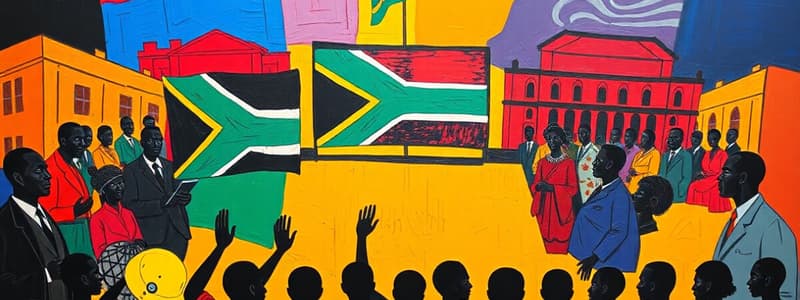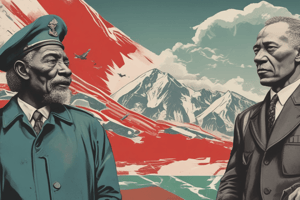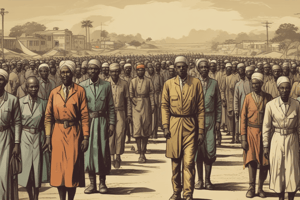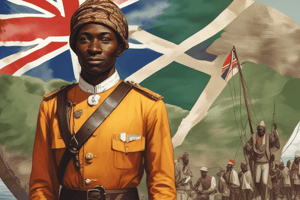Podcast
Questions and Answers
What was the outcome of the negotiation process involving the South Africa Act?
What was the outcome of the negotiation process involving the South Africa Act?
- It divided South Africa into multiple provinces governed by indigenous leaders.
- It established independent states for the indigenous populations.
- It created a unitarystate known as the Union of South Africa. (correct)
- It granted full voting rights to all citizens.
Who was primarily granted the right to vote under the Union Constitution?
Who was primarily granted the right to vote under the Union Constitution?
- All adults living in South Africa.
- White men only. (correct)
- Women of all races.
- The indigenous population.
How did the Union Constitution view African society?
How did the Union Constitution view African society?
- As fully capable of self-governance.
- As an equal part of the government.
- As a society that should be westernized immediately.
- As traditionally governed by chiefs under white oversight. (correct)
What powers were given to the Governor-General in Council according to section 147 of the Union Constitution?
What powers were given to the Governor-General in Council according to section 147 of the Union Constitution?
What was the nature of the franchise granted to black South Africans in the Cape?
What was the nature of the franchise granted to black South Africans in the Cape?
Which statement best describes the overall treatment of the black majority under the founding Constitution?
Which statement best describes the overall treatment of the black majority under the founding Constitution?
What was the purpose of the compromise allowing the Cape to retain limited voting rights for black citizens?
What was the purpose of the compromise allowing the Cape to retain limited voting rights for black citizens?
What type of governmental system was established by the Union Constitution?
What type of governmental system was established by the Union Constitution?
What event is often mistakenly considered the beginning of South Africa's political history?
What event is often mistakenly considered the beginning of South Africa's political history?
What was the legal document that marked the creation of the Union of South Africa?
What was the legal document that marked the creation of the Union of South Africa?
What major group's existence in South Africa is often overlooked in colonial narratives?
What major group's existence in South Africa is often overlooked in colonial narratives?
Why is it challenging to discuss pre-colonial history of South Africa?
Why is it challenging to discuss pre-colonial history of South Africa?
What is one reason South Africa's legal borders are often referenced starting in 1910?
What is one reason South Africa's legal borders are often referenced starting in 1910?
What aspect of South African society should not be ignored when discussing its historical context?
What aspect of South African society should not be ignored when discussing its historical context?
Which of the following groups governed themselves prior to colonial arrival?
Which of the following groups governed themselves prior to colonial arrival?
What problem arises from viewing South Africa's history solely through a colonial lens?
What problem arises from viewing South Africa's history solely through a colonial lens?
What was the main issue at the center of the constitutional crisis faced by the Union?
What was the main issue at the center of the constitutional crisis faced by the Union?
What legislation did the National Party attempt to implement to remove 'coloured' voters?
What legislation did the National Party attempt to implement to remove 'coloured' voters?
What was the outcome of the Harris and Others v Minister of Interior case?
What was the outcome of the Harris and Others v Minister of Interior case?
How did the National Party respond after being thwarted in its legislative attempts?
How did the National Party respond after being thwarted in its legislative attempts?
What was a significant factor in the compromise on the South African Constitution?
What was a significant factor in the compromise on the South African Constitution?
Which party played a dominant role in influencing the final text of the South African Constitution?
Which party played a dominant role in influencing the final text of the South African Constitution?
What was the required support in the National Assembly for passing constitutional amendments?
What was the required support in the National Assembly for passing constitutional amendments?
Which principle did the Constitutional Assembly comply with during the constitutional negotiations?
Which principle did the Constitutional Assembly comply with during the constitutional negotiations?
What is the main theme explored in the works of Southall regarding South African politics?
What is the main theme explored in the works of Southall regarding South African politics?
Which concept is discussed in connection with party dominance in South Africa?
Which concept is discussed in connection with party dominance in South Africa?
What aspect of South African politics does the term 'opposition parties' primarily relate to?
What aspect of South African politics does the term 'opposition parties' primarily relate to?
In discussions of South Africa's party system, which form does the dominant party take?
In discussions of South Africa's party system, which form does the dominant party take?
What does the term 'learning to lose' refer to in the context of South African political transitions?
What does the term 'learning to lose' refer to in the context of South African political transitions?
Which political development has South Africa witnessed in its first decade after apartheid?
Which political development has South Africa witnessed in its first decade after apartheid?
What is one of the major implications of a dominant-party system on civil society?
What is one of the major implications of a dominant-party system on civil society?
Which study discusses the challenges faced by opposition parties in post-apartheid South Africa?
Which study discusses the challenges faced by opposition parties in post-apartheid South Africa?
What role do political parties play in the South African political system?
What role do political parties play in the South African political system?
Which political party has consistently won national elections in South Africa since 1994?
Which political party has consistently won national elections in South Africa since 1994?
What trend has been observed regarding the ANC's electoral support since 1994?
What trend has been observed regarding the ANC's electoral support since 1994?
How is the political situation in South Africa often described due to the ANC's dominance?
How is the political situation in South Africa often described due to the ANC's dominance?
What has been the ANC's percentage of the vote in the 2014 national election?
What has been the ANC's percentage of the vote in the 2014 national election?
What is a potential consequence of the ANC's continued electoral dominance?
What is a potential consequence of the ANC's continued electoral dominance?
Which party has been identified as the closest competitor to the ANC in the elections?
Which party has been identified as the closest competitor to the ANC in the elections?
How do advocates of the dominant party thesis view the influence of the ANC?
How do advocates of the dominant party thesis view the influence of the ANC?
How do democratic constitutions depend on historical context for their interpretation?
How do democratic constitutions depend on historical context for their interpretation?
Why are constitutions considered living documents in democratic states?
Why are constitutions considered living documents in democratic states?
What role do judges play in the application of constitutional law?
What role do judges play in the application of constitutional law?
In what way do constitutions reflect the political power of the drafting elites?
In what way do constitutions reflect the political power of the drafting elites?
How does the global context affect the operation of a national constitution?
How does the global context affect the operation of a national constitution?
What was the main issue raised by Chief Justice J.G. Kotze regarding the legislation passed by the Volksraad in 1892?
What was the main issue raised by Chief Justice J.G. Kotze regarding the legislation passed by the Volksraad in 1892?
How did President Paul Kruger respond to the Chief Justice's attempt to review the legislation?
How did President Paul Kruger respond to the Chief Justice's attempt to review the legislation?
Describe the governance structure typically found within the indigenous chiefdoms in South Africa.
Describe the governance structure typically found within the indigenous chiefdoms in South Africa.
What warning did President Kruger give to the new Chief Justice regarding judicial review?
What warning did President Kruger give to the new Chief Justice regarding judicial review?
What societal attitude was reflected in the South African Constitution of 1858 regarding racial equality?
What societal attitude was reflected in the South African Constitution of 1858 regarding racial equality?
What key factors make it difficult to accurately discuss pre-colonial history in South Africa?
What key factors make it difficult to accurately discuss pre-colonial history in South Africa?
How do colonial narratives often misrepresent the historical context of South Africa's democracy?
How do colonial narratives often misrepresent the historical context of South Africa's democracy?
Why is the year 1910 significant in discussions about South Africa's legal history?
Why is the year 1910 significant in discussions about South Africa's legal history?
What does legal pluralism in South Africa refer to in the context of its political history?
What does legal pluralism in South Africa refer to in the context of its political history?
What impact did the lack of written records of pre-colonial governance have on South Africa's constitutional development?
What impact did the lack of written records of pre-colonial governance have on South Africa's constitutional development?
Flashcards are hidden until you start studying
Study Notes
Origins of the South African Union
- The South Africa Act (1909) unified four settler colonies: Cape, Natal, Orange Free State, and Transvaal.
- It established a unitary state called the Union of South Africa.
- The Constitution granted parliamentary democracy to the white minority (only men could vote).
- It largely disregarded the aspirations of indigenous South Africans and placed the black majority under autocratic rule.
The Union Constitution: Limited Black Franchise
- The Union's constitution allowed the Cape to retain limited voting rights for black citizens, but northern provinces excluded black participation in elections.
- The limited franchise for black South Africans in the Cape did not change the fundamentally racist and paternalistic nature of the constitution.
The 'Traditional' African Society
- The South African Constitution portrayed African society as fundamentally 'traditional' and governed by chiefs under the control of a white government.
- Section 147 of the Union Constitution placed native affairs under the jurisdiction of the Governor-General in Council, giving them special powers over native administration.
Challenging the Colonial Narrative
- South Africa's political and constitutional history often begins with the arrival of Jan van Riebeeck in 1652, ignoring the pre-colonial presence of the Khoi-San and other indigenous groups.
- There are difficulties in accurately reconstructing pre-colonial governance structures due to a lack of written records and a lack of clarity about the diverse structures in place before colonial rule.
- South Africa's current borders were established in 1910.
The National Party and Racial Segregation
- The National Party (NP) won the 1948 election on a platform of racial segregation.
- The NP attempted to remove 'coloured' voters from the common voters' roll through the Separate Representation of Voters Act in 1951.
- The Appellate Division found the act invalid due to procedural violations.
The South African Constitution of 1996
- The 1996 constitution was created by the Constitutional Assembly, a body representing diverse political groups.
- The process of drafting the constitution involved compromises, particularly between the NP and the African National Congress (ANC).
- Some argue that the constitution's text would not have been significantly different even without the Constitutional Principles, as the NP and ANC were unable to achieve a two-thirds majority on their own.
The Role of Political Parties in South African Democracy
- Political parties, especially the dominant ANC, play a crucial role in South African politics due to the electoral system and the legacy of liberation movements.
- The ANC has won every national election since 1994, although its support has been decreasing.
- The steady electoral dominance of the ANC has raised concerns about the consequences for democratic institutions and the operation of constitutional structures.
The Dominant Party thesis
- The description of South Africa's political system as a "dominant party democracy" is disputed.
- The electoral dominance of the ANC has potential consequences for the functioning of constitutional institutions, as the dominant party may have disproportionate influence.
Democratic Constitutions
- Democratic constitutions aren't simply legal documents outlining how state organs operate.
- They reflect the historical context of the nation and current social, economic, and political realities.
- These factors play a vital role in interpreting and evaluating constitutional provisions.
- The global context in which the constitution operates is also important.
- Constitutional law is considered the most politically charged branch of law because of this.
- To understand how a constitution functions in practice, it's crucial to consider the text while also analyzing the broader context.
- Constitutions are considered snapshots of a nation's hopes and dreams at the time of their creation.
- Constitutions are living documents interpreted and applied by judges in a constantly evolving environment.
South Africa's Constitutional History
- South Africa’s colonial history is often incorrectly viewed as beginning in 1652 with the arrival of Jan van Riebeeck.
- It’s equally wrong to consider 1910, when the Union of South Africa was formed, as the start of South Africa’s constitutional history.
- This colonial perspective overlooks the presence of Khoi-San-speaking peoples in the Western parts of the country and agro-pastoralists in the East.
- Despite the pre- colonial history, it's challenging to discuss South African history without acknowledging the influence of colonialism.
- Pre-colonial history was not documented.
- There is limited information on the governance structures of pre-colonial indigenous populations.
- The modern South Africa with its current borders was legally established in 1910.
Governance Under Apartheid
- The 1858 Constitution of the South African Republic (Transvaal) was explicitly racist, denying any equality between colored and white people.
- A constitutional crisis emerged when Chief Justice JG Kotze attempted to strike down legislation passed by the Transvaal legislature in 1892.
- President Paul Kruger rejected the court's authority to review and strike down legislation, as well as dismissed the Chief Justice.
- Areas of South Africa not directly under colonial rule exhibited various forms of indigenous governance structures based on the concept of chiefdoms.
- These chiefdoms typically had a hierarchical structure with a chief, paramount chief, or king at the top.
- Headmen, representing leading families, were responsible for affairs within their areas and reported to the chief.
- The chief, together with his headmen, formed a council, with family or kraal heads serving below them.
Traditional Governance Structures
- Traditional governance structures of indigenous South Africans have been overlooked in constitutional law textbooks.
- Focus has often been on the imposition of the Westminster model by the British and the incorporation of Roman-Dutch and English common law.
- The 1996 Constitution partially recognizes traditional governance structures.
- However, these structures were transformed due to colonial rule, altering their development.
The Union of South Africa and Bifurcated State
- After the British victory over the Boers in the Anglo-Boer War (1899-1902), the territory of South Africa became largely under British control.
- The Union of South Africa was formed in 1910, as part of a British policy of granting self-rule to white colonists. Black South Africans were excluded from the negotiations.
Transformative Constitutionalism
- Transformative constitutionalism aims to dismantle structures of inequality and promote social justice.
- Transformative constitutionalism can be seen as an ongoing project that requires sustained legal and judicial interpretation to achieve its goals.
- The success of transformative constitutionalism is challenged by the broader legal culture and the existing liberal democratic framework in South Africa.
- Transformative constitutionalism may struggle to gain traction in a legal system that is largely liberal democratic, even with some innovations.
Interpreting the South African Constitution
- The starting point for interpreting the South African Constitution is always the text of the relevant provisions.
Studying That Suits You
Use AI to generate personalized quizzes and flashcards to suit your learning preferences.




